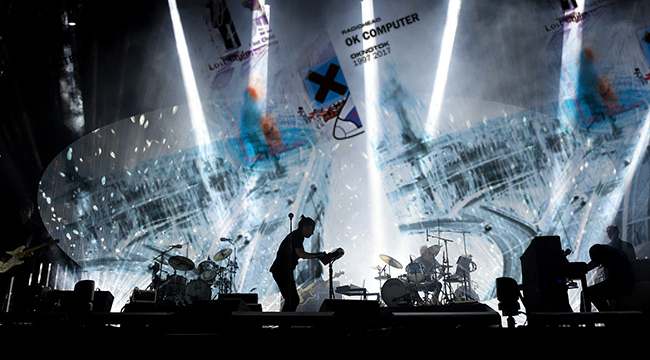
In lesser hands, ‘Paranoid Android’ would have been pretentious and obnoxious, but the care with which it is constructed and the brilliance of the musicianship lie at the heart of its magnificence. Magnus Carlsson’s oblique yet deeply unsettling animated video reinforced this idea. He told Q magazine at the time: “The ‘kicking squealing Gucci little piggy’ was inhuman – someone spilled a drink over her and she turned into this fiend.” The image fragments of “the dust and screaming / the yuppies networking” and “unborn chicken voices in my head” set the tone while leaving the listener to guess at the psychological terror and dystopian themes that lie underneath. Yorke’s lyrics were inspired by the group’s unhappy experiences in America, particularly a disturbing episode he witnessed in a chic Los Angeles bar were “everyone was out of their minds on coke”. A six-and-a-half-minute multi-segmented epic in the vein of ‘Bohemian Rhapsody’ or ‘Happiness Is A Warm Gun’, this bloodcurdling masterpiece whose title referenced the depressed robot Marvin from Douglas Adams’ The Hitch-Hiker’s Guide To The Galaxy unexpectedly became Radiohead’s biggest hit ever when it hit no.3 in the UK charts ahead of the release of its parent album. 20 years later, it’s arguably the most enduring moment on an album whose political and societal relevance is still obvious.Ī strong contender for the greatest song of the 1990s, OK Computer’s thrillingly uncompromising lead single ‘Paranoid Android’ is probably worthy of an entire feature all to itself. ‘Real’ guitars stand off against the processed, looped beats and ricocheting studio effects.

In ‘Airbag’, the central paradox of the album is set up – at the same as the musicians and producers around him take delight in exploring the possibilities of technology, Yorke himself is worried by the long-term implications of it. Specifically, it’s about the uneasy illusion of safety offered by modern transport. Ballard’s Crash, a magazine article titled ‘An Airbag Saved My Life’ and The Tibetan Book Of The Dead.

Thom Yorke’s elliptical lyrical connections between automobile accidents and concepts of reincarnation ( “in the neon sign / scrolling up and down / I am born again”) were inspired by J.G. Inspired by DJ Shadow’s groundbreaking Endtroducing… album, the percussion was built through seconds-long samples of Phil Selway’s drumming being cut-up and painstakingly re-arranged, and built on a dub-inspired stop/start bassline, ‘Airbag’ was so refreshingly different to the reductive nostalgia of Britpop. Immediately, ‘Airbag’s use of sampling and the computer-constructed atmospherics that enshroud the reverberating guitars signal that Radiohead intend to diverge from the majority of concurrent mid-‘90s rock. READ MORE: Radiohead’s OK Computer at 20 years oldįrom the very start, the listener is made aware that OK Computer will be a more ambitious work than The Bends. Open up the album on Spotify here and give it a listen! Over its 12 tracks, there is the sense of a struggle between mankind’s accelerating ability to invent new technology and its capacity to cope with the revolutionary nature of those inventions as they became widespread in society, with Yorke constantly wishing for an escape hatch from this feeling of uneasiness.Īs a companion piece to our 20 th anniversary piece on OK Computer, below is a track-by-track listening guide for this massively significant record. We were more connected than ever before, yet curiously, we were lonelier shopping could be brought to your door, but that came at the cost of community consumer culture tells us the customer is always right, yet as citizens, we’re more powerless than ever. With themes of social atomisation and disconnection and of unaccountable, invisible power in politics, Radiohead seemed to take the temperature of Western civilisation as the age of globalisation and the internet began to encroach.Īs the ‘information superhighway’ opened out and social media evolved at the end of the noughties, suddenly Radiohead’s anxieties on OK Computer seemed relevant all over again.

June 2017 sees the 20 th anniversary of OK Computer, rightly held up as one of the greatest rock records not only of the 1990s, but of all time.


 0 kommentar(er)
0 kommentar(er)
